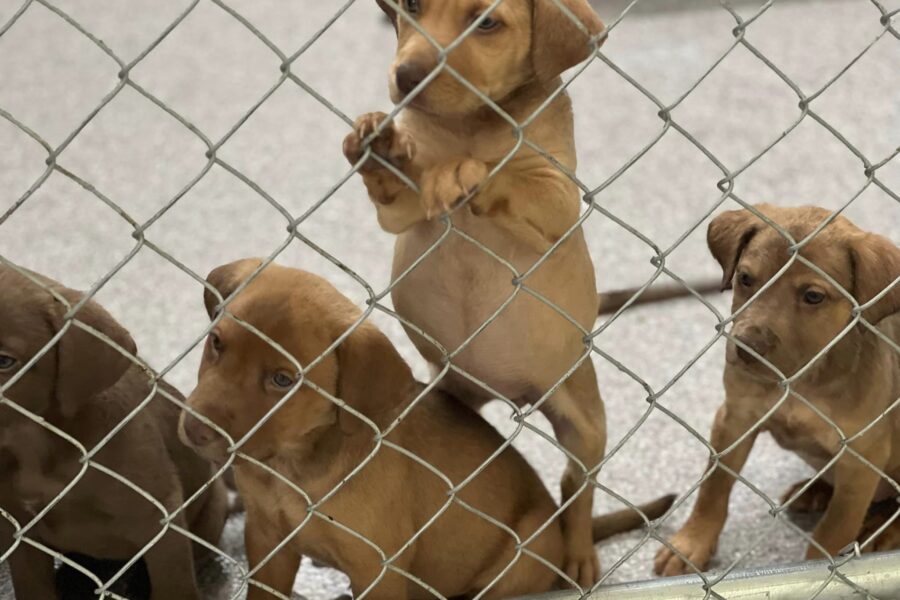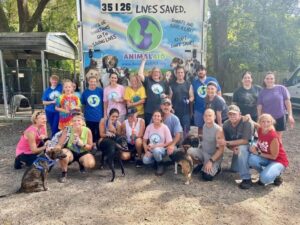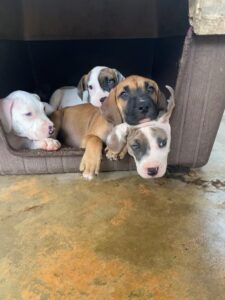
The volunteers at Animal Aid USA take a trip to rural Georgia every four weeks to rescue stray and abandoned dogs and give them a home. To date, they have rescued 40,000 dogs from unimaginable conditions.
Our canine friends teach us one of the most important lessons of life: it’s too short for anything less than unconditional love, compassion and forgiveness, all the time.
Karen Talbot, Rachel Monaghan and the volunteers at Animal Aid USA have taken that lesson to heart. Their mission is to return the favor of unconditional love to as many dogs as possible.
As anyone who participates in their rescue caravans can tell you, it’s a big challenge. Talbot herself says it’s not for everyone. “It’s grueling on that road.”
Animal Aid USA gathers volunteers, vehicles, water bowls, blankets, crates, and whatever else is needed, for a trip to rural Georgia from Williamstown every 28 days. They then gather abandoned dogs from local shelters in the area, load the dogs into vehicles, and take a 16-hour overnight drive back to New Jersey to place dogs with no-kill shelters to be adopted.

A 64-word paragraph can’t begin to capture the level of effort involved in the operation. Monaghan, a regular volunteer, describes the process:
“We leave at 6:00 at night and arrive in Georgia around 9:00 AM the next day,” she explains. “Once we get down there, we prepare our vans with water bowls and line all our crates. If we have litters of puppies in our vans, we’ll extra line the crates because we usually have to change them while we’re driving.
“That’s on a Thursday. Friday is when we do all of our preparation. In the morning, we’ll clean the kennels again and then we prepare for transport. We usually have about 30 crates in each van, we put puppy pads and towels or blankets in all the crates. Karen tags them all so we know which dogs are gonna be in our van. We prepare extra water bowls, extra towels and stuff to clean up any messes that happen.”
“At around 4:00, we start the load, we’re out of there by 5:15. Everyone’s just going in every direction. It’s like all hands on deck.”
Talbot, who spends much of her life preparing for the trips, likens it to a Broadway production.
“All of the preparation and the dress rehearsals and everything that you have to do lead up to one moment, and that one moment is “It’s load-up time.” That’s when everything has to be done, done, done, because the first dog in is gonna be in there the longest, and it’s all about getting them all in the right crates and making sure everybody fits.
“Once they’re all in we do our giant prayer circle and we’re off.”
The crew of vehicles with its precious cargo, including the rig mostly driven by Talbot’s husband Dante, then drives through the night…the only time D.C. traffic on I-95 is avoidable…back to New Jersey, where dogs are unloaded and placed with Animal Aid USA’s adoption partners. The project is both exhilarating and exhausting.
“Then you get home and you crash,” Monaghan laughs.
So why rural Georgia, 16 hours away, every four weeks? Surely there are plenty of stray and abandoned animals in New Jersey?
Probably. But in Georgia and several other states, many rural counties don’t have the resources to care for stray dogs. Sadly, it isn’t often even for a lack of funding. There’s simply a different attitude towards dogs in the places where the caravan goes.

It was quite the culture shock for Talbot, as it would be for any animal lover.
Monaghan laments that “All the shelters are pretty much kill shelters. None of them do public adoptions or rescue. If they’re not claimed by their owner, they usually get euthanized.”
Talbot describes the horrific conditions that dogs endure. “They’re not even shelters. They’re death holes. They’re a cinder block hut with a carport on top that they call a shelter. There’s no A/C, there’s no heat, and some of them don’t get fed. They’re just there to hold until they’re killed.”
Hearing the stories can take an observer from “Why do people do all of this to rescue dogs?” to “How can anyone with a heart not do something?”
I n Rachel Monaghan’s case, she wanted to do something to overcome her grief after losing her own dog unexpectedly. She learned about Animal Aid USA through a friend and has been hooked ever since her first trip.
“I was planning on going on three trips that year,” she remembers, “and I ended up going on I think six. I just became a regular caravan member.
“The best part for me is seeing the transformation. Obviously, it’s awful what they go through, but seeing the resilience of them, and how they just still continue to love and trust people.”
Talbot says of the people giving their time to the caravan, “I’ve discovered that it’s not just them saving dogs. This movement has saved them. It’s saved their marriages, it’s stopped them from drinking, it’s made their life better at home. It’s their outlet to get away for a while to do something bigger than them.
“Nobody gets that until you come on a trip. Our motto at camp is ‘Our strangers leave as family’. And it happens to everybody. If you have a soul, it happens to you. It can’t not.”
In the face of a mentality that has existed for generations in this part of the world, Talbot and her team have taken on the most difficult of tasks: not just rescuing dogs…over 40,000 of them now…but also changing an established mindset that creates the need for their rescuing.
“You see it, in just the blank stares,” Talbot says. “People cannot believe that, first of all, we would drive that far for a dog, and second of all, why?
“What we’ve learned is with our continuous journeys there, and the trust that we’ve built with these people. They know we’re not there to do anything except help. We want to change the next generation, we want to break this cycle, which we are.”
Talbot has seen that transformation in personal relationships, such as with a hardened animal control officer who now reaches out to Karen for help with dogs he finds.
“We laugh about it today,” she reflects. “When he first met me, he grunted at me, wouldn’t even make eye contact with me. I said look, I’m not here to point fingers, I’m here to help.
“A couple of years went by, and he started to talk to me, he gave me his cell phone number. Then a couple of years later he was just like, ‘Hey, Karen, listen, I got a so and so dog that just came in, you think y’all can take this one?’
“And this relationship blossomed. Plus, some Tastykake cupcakes from up here helped too,” she adds with a chuckle.
Karen Talbot doesn’t spotlight her own role in rescuing dogs, even though it’s considerable. To her, it’s simply her life’s work. She always emphasizes the word “we” when speaking of the efforts of everyone involved.
“I had an idea, and I had a vision, but a vision is just a vision unless an army comes together to actually make that vision become a reality. We’re all volunteers, it’s just a life-long mission of ours.”
By providing the education, awareness and resources, she says, “We are empowering the next generation to make a change in their world for companion animals. You’ve got rescue groups all over. But are you changing the mindset while you’re doing it?
“We are, and I think that’s what I’m most proud of.”
An Animal-Loving Bachelor
The rescue caravans at Animal Aid USA operated under different names in its early years, including MOMS (Making Of Miracle Stories) Rescue and Paws For A Cause, as Karen Talbot worked to raise awareness of dog rescues in rural Georgia.
Talbot fondly recalls the story of the huge contribution from Lorenzo Borghese, a name you may know… he was The Bachelor in the show’s ninth season. Borghese is an animal lover himself, and he wanted to help when he saw a documentary about the rescue operation.
As Talbot understood, his endorsement meant far more than a financial contribution he could have made.
“I was contacted by somebody who knew Lorenzo,” she remembers. “They wanted me to get introduced because [Talbot’s husband] Dante and I had started to take trips to Georgia. We went on our first trip in January of 2011, and on that trip, we had a borrowed van, and we went down for 23 puppies.
“Once I met with Lorenzo, what I loved about him was there weren’t layers to get to him. He was the real deal, he reached out to me personally. I gave him a copy of the documentary which we had done.
“He knew that Dante and I were going back and forth to Georgia and funding everything on our own dollars and credit cards. Once he left our meeting he went home, watched this 25-minute documentary and was hooked.
“He said, ‘Are you looking for a check? Are you looking for money?’ I said, ‘No, I don’t want your money. I want something more important. I want a voice. People know who you are, they recognize you, they don’t know me.’”
Borghese suggested creating Animal Aid as an umbrella for MOMS Rescue, to which he then lent his endorsement to. The “USA” was added when they learned that another “Animal Aid” already existed.
“That’s when Animal Aid was born, and so we incorporated Animal Aid as a non-profit. All the while, I still kept Making of Miracle Stories, and Animal Aid just took off.”
Borghese adding his voice undoubtedly helped the effort. Talbot made a wise choice asking for it over a check… which she says would have been spent in a week and immediately forgotten.
The Video
On the Animal Aid USA website, you can watch a video of them being featured in “To the Rescue” docuseries, with host Tommy Habeeb narrating the full experience of the caravan going back and forth from Williamstown.
The video shows the Georgia compound where dogs are held until the caravan arrives, as well as the medical facility where vets handle spays, neuters, and heartworm treatments. Habeeb hears about the entire process from Talbot, who describes the logistics from dog food deliveries to the 38-foot transport rig that holds 64 crates.
Throughout the video, you see Georgia dogs in their natural state of being adorable, making the work that Talbot describes as grueling seem not only worth the effort but not difficult at all. But Talbot shares that people are exhausted by the end of the project, wondering what they’ve signed on for until the sun comes up during the ride home and they see the light at the end of the tunnel.
The caravans could easily be a reality show, you might think while watching. But Talbot is quick to shoot down pitching the idea of a reality show to a network, as this writer suggested.
“It’s a real reality show every 28 days down there,” she says. “But for me, living it on a daily basis and being in Georgia… Rachel’s amazing, it’s not a bad idea for her to set up a YouTube channel with a following where we are real and raw.
“You’re not getting raw in reality TV. And you’re also controlled, and it’s scripted, and I am the furthest from being controlled or scripted.
“They don’t like that at all!” she says with a laugh.
The video is well worth a watch… go to “www.animalaidusa.org/to-the-rescue” to see it.
Put It On Your Bucket List
Karen Talbot and Rachel Monaghan were happy to invite this observer to join them for a caravan trip. It’s something to consider, even if you just like long overnight road trips and need a worthwhile reason.
As Talbot says, the caravan has even saved marriages, and she cites her own as an example. Her husband Dante, who now drives and maintains the big rig of the caravan, had at one point tired of her devotion to the cause and requested a divorce.
“I immediately chose the dogs,” Talbot says.
“The following summer after the giant Georgia puppy caravan, we then had our documentary premiere in Philadelphia, and all the people that came on the caravan… the pilot, the rescue groups, everybody, was in attendance at the Trocadero.
“Dante was there because we were still friends, and he saw what I was doing from our bedroom on a computer, and he vowed to make it up to me the rest of my life if we got back together.”
The power of puppy faces. “It’s really funny because the reason we divorced was dogs, and once we re-married and got back together again, he’s worse than I am with dogs.”
Hopefully, your marriage isn’t in need of helping dogs to save it, but if you’re interested in lending a hand and the life transformation that all of the volunteers speak about, you can reach out on Animal Aid USA’s website and see if they need help with the caravans, which they usually do.
“Put it on a bucket list at least once in your life,” says Talbot.

